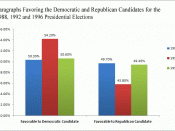The Media's Role in Informing the Public "'We do not often print everything we know,'" reveals David Lawerence, publisher of the Miami Herald (qtd. in Valente 4). There is a contrast between printing everything that is known, selecting information to disregard, and presenting information that is simply false. This difference has an impact on society. Media personnel representing a major bias also have an affect on facts that are being analyzed by the masses. Thus, accuracy in journalism is important to help an informed public make decisions.
"Journalists are trained to operate under a professional code of values and ethicsâ¦" states a foreman for the Society of Professional Journalists ("Code of Ethics" 1). According to the SPJ, each individual in the media is aware of their code of ethics. An important ethical concern of the society is that journalists need to be accountable to their readers, listeners, viewers, and each other.
They are responsible to "test the accuracy of information from all sources and exercise care to avoid inadvertent error" (1). The society does not permit the deliberate misuse of information. Not only that, but "unethical practices of other journalistsâ¦should be uncovered and exposed" (2). The SPJ does contend however, that a journalist's main interest should be the public's right to know (2). Lastly the society states that if there is any miscommunication between the public and journalists, the public should be "encouraged to voice their grievances against the news media" (3). The SPJ, along with other organizations such as AIM.org and FAIR.org, is promoting accuracy and media fairness, but also trying to ensure careers of respectable journalists without compromising the legitimacy of information.
Many editors and journalists in the media agree that there are journalists who do not abide by the code of ethics presented by the Society of...


